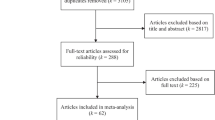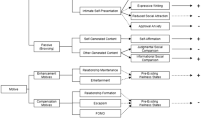Abstract
Background
Individuals with diabetes are at increased risk of elevated depressive symptoms, and social support has been identified as a key factor in the health of this population. Cross-sectional associations between depressive symptoms and social support have been demonstrated. Three classes of hypotheses differentially describe the direction of this association: (1) depressive symptoms influence social support, (2) social support influences depressive symptoms, and (3) reciprocal associations exist between depressive symptoms and social support.
Purpose
The aim of this study was to compare these hypotheses.
Methods
Depressive symptoms and social support were measured via telephone survey in a large cohort study of individuals with diabetes (n = 1754) in Quebec, Canada. After baseline, data were collected annually for 4 years. Path models depicting each hypothesis, as well as a stability model containing only autoregressive effects, were generated, and model fit was compared with Akaike’s Information Criterion (AIC).
Results
The reciprocal model was selected as the best fitting model because it had the lowest AIC. This model demonstrated that depressive symptoms predicted subsequent social support at all time points and that social support predicted subsequent depressive symptoms at most time points.
Conclusions
It appears that the association between depressive symptoms and social support in people with diabetes is best characterized as reciprocal. Results underscore the importance of directly comparing competing hypotheses and offer a more accurate depiction of the association between depressive symptoms and social support among people with diabetes.

Similar content being viewed by others
References
Fisher L, Skaff M, Mullan J, et al. A longitudinal study of affective and anxiety disorders, depressive affect and diabetes distress in adults with type 2 diabetes. Diabetic Med. 2008; 25: 1096-1101.
Peyrot M, Rubin RR. Levels and risks of depression and anxiety symptomatology among diabetic adults. Diabetes Care. 1997; 20: 585-590.
van Dam HA, van der Horst FG, Knoops L, et al. Social support in diabetes: a systematic review of controlled intervention studies. Patient Educ Couns. 2005; 59: 1-12.
Stopford R, Winkley K, Ismail K. Social support and glycemic control in type 2 diabetes: a systematic review of observational studies. Patient Educ Couns. 2013; 93: 549-558.
Wu S-FV, Young L-S, Yeh F-C, et al. Correlations among social support, depression, and anxiety in patients with type-2 diabetes. J Nurs Res. 2013; 21: 129-138.
Sacco WP, Yanover T. Diabetes and depression: the role of social support and medical symptoms. J Behav Med. 2006; 29: 523-531.
Osborn CY, Egede LE. The relationship between depressive symptoms and medication nonadherence in type 2 diabetes: the role of social support. Gen Hosp Psychiat. 2012; 34: 249-253.
Coyne JC. Self-reported distress: analog or ersatz depression? Psychol Bull. 1994; 116: 29-45.
Goldney RD, Phillips PJ, Fisher LJ, Wilson DH. Diabetes, depression, and quality of life a population study. Diabetes Care. 2004; 27: 1066-1070.
Carper MM, Traeger L, Gonzalez JS, et al. The differential associations of depression and diabetes distress with quality of life domains in type 2 diabetes. J Behav Med. 2014; 37: 501-510.
Gonzalez JS, Shreck E, Psaros C, Safren SA: Distress and Type 2 Diabetes-Treatment Adherence: A Mediating Role for Perceived Control. Health Psychol. 2015; 34:505--513.
Lin EH, Katon W, Von Korff M, et al. Relationship of depression and diabetes self-care, medication adherence, and preventive care. Diabetes Care. 2004; 27: 2154-2160.
Adriaanse MC, Pouwer F, Dekker JM, et al. Diabetes-related symptom distress in association with glucose metabolism and comorbidity the Hoorn study. Diabetes Care. 2008; 31: 2268-2270.
Lin EH, Rutter CM, Katon W, et al. Depression and advanced complications of diabetes a prospective cohort study. Diabetes Care. 2010; 33: 264-269.
Cohen S. Social relationships and health. Am Psychol. 2004; 59: 676.
Rad GS, Bakht LA, Feizi A, Mohebi S. Importance of social support in diabetes care. J Educ Health Promo. 2013; 2.
Strom JL, Egede LE. The impact of social support on outcomes in adult patients with type 2 diabetes: a systematic review. Curr Diabetes Rep. 2012; 12: 769-781.
Cohen S, Wills TA. Stress, social support, and the buffering hypothesis. Psychol Bull. 1985; 98: 310.
Landerman R, George LK, Campbell RT, Blazer DG. Alternative models of the stress buffering hypothesis. Am J Commun Psychol. 1989; 17: 625-642.
Ibarra-Rovillard MS, Kuiper NA. Social support and social negativity findings in depression: perceived responsiveness to basic psychological needs. Clin Psychol Rev. 2011; 31: 342-352.
Koizumi Y, Awata S, Kuriyama S, et al. Association between social support and depression status in the elderly: results of a 1‐year community‐based prospective cohort study in Japan. Psychiat Clin Neuros. 2005; 59: 563-569.
Hipkins J, Whitworth M, Tarrier N, Jayson G. Social support, anxiety and depression after chemotherapy for ovarian cancer: a prospective study. Brit J Health Psych. 2004; 9: 569-581.
De Leeuw J, De Graeff A, Ros W, et al. Negative and positive influences of social support on depression in patients with head and neck cancer: a prospective study. Psycho‐oncol. 2000; 9: 20-28.
Gilden JL, Hendryx MS, Clar S, Casia C, Singh S. Diabetes support groups improve health care of older diabetic patients. J Am Geriatr Soc. 1992.
Evraire LE, Dozois DJ. An integrative model of excessive reassurance seeking and negative feedback seeking in the development and maintenance of depression. Clin Psychol Rev. 2011; 31: 1291-1303.
Coyne JC. Toward an interactional description of depression. Psychiatr. 1976; 39: 28-40.
Starr LR, Davila J. Excessive reassurance seeking, depression, and interpersonal rejection: a meta-analytic review. J Abnorm Psychol. 2008; 117: 762.
Maher MJ, Mora PA, Leventhal H. Depression as a predictor of perceived social support and demand: a componential approach using a prospective sample of older adults. Emotion. 2006; 6: 450.
Vinokur A, Schul Y, Caplan RD. Determinants of perceived social support: interpersonal transactions, personal outlook, and transient affective states. J Pers Soc Psychol. 1987; 53: 1137.
Leskelä U, Melartin T, Rytsälä H, et al. The influence of major depressive disorder on objective and subjective social support: a prospective study. J Nerv Ment Dis. 2008; 196: 876-883.
Sarason IG, Sarason BR, Shearin EN. Social support as an individual difference variable: its stability, origins, and relational aspects. J Pers Soc Psychol. 1986; 50: 845.
Stice E, Rohde P, Gau J, Ochner C. Relation of depression to perceived social support: results from a randomized adolescent depression prevention trial. Behav Res Ther. 2011; 49: 361-366.
Lazarus RS, Folkman S. Stress, appraisal, and coping. New York: Springer; 1984.
Aneshensel CS, Frerichs RR. Stress, support, and depression: a longitudinal causal model. J Community Psychol. 1982; 10: 363-376.
Patten SB, Williams JV, Lavorato DH, Bulloch AG. Reciprocal effects of social support in major depression epidemiology. Clin Pract Epidemiol Ment Health. 2010; 6: 126-131.
Tukey J. Discussion of“assessment and propagation of model uncertainty,” by D. Draper. J RStat Soc Ser B. 1995; 57: 45-70.
Long JD. Longitudinal data analysis for the behavioral sciences using R. Thousand Oaks: Sage; 2011.
Noar SM, Zimmerman RS. Health behavior theory and cumulative knowledge regarding health behaviors: are we moving in the right direction? Health Educ Res. 2005; 20: 275-290.
Schmitz N, Nitka D, Gariepy G, et al. Association between neighborhood-level deprivation and disability in a community sample of people with diabetes. Diabetes Care. 2009; 32: 1998-2004.
Kroenke K, Spitzer RL, Williams JB. The PHQ-9: validity of a brief depression severity measure. J Gen Intern Med. 2001; 16: 606-613.
Sherbourne CD, Stewart AL. The MOS social support survey. Soc Sci Med. 1991; 32: 705-714.
RAND: Medical outcomes study: Social support survey scoring instructions from http://www.rand.org/health/surveys_tools/mos/mos_socialsupport_scoring.html
Martens MP, Haase RF. Advanced applications of structural equation modeling in counseling psychology research. Couns Psychol. 2006; 34: 878-911.
Kenny DA. Cross-lagged panel correlation: a test for spuriousness. Psychol Bull. 1975; 82: 887.
Burnham KP, Anderson DR. Model selection and multimodel inference: a practical information-theoretic approach. New York: Springer; 2002.
Anderson DR. Model based inference in the life sciences: a primer on evidence. New York: Springer; 2008.
Schwarz C. Sampling, regression, experimental design and analysis for environmental scientists, biologists, and resource managers. Burnaby: Department of Statistics and Actuarial Science, Simon Fraser University; 2011.
Southwick SM, Vythilingam M, Charney DS. The psychobiology of depression and resilience to stress: implications for prevention and treatment. Annu Rev Clin Psychol. 2005; 1: 255-291.
Gucciardi E, Wang SC-T, DeMelo M, Amaral L, Stewart DE. Characteristics of men and women with diabetes observations during patients’ initial visit to a diabetes education centre. Can Fam Physician. 2008; 54: 219-227.
Wilson DK. Behavior matters: the relevance, impact, and reach of behavioral medicine. Ann Behav Med. 2015; 1–9.
Acknowledgments
RB is supported by a Canadian Institutes of Health Research (CIHR) fellowship (201411MFE-338860 FRN-142923). SD is supported by a postdoctoral fellowship from the Fonds de recherche du Québec. The Diabetes Health Study was funded by the Canadian Institutes of Health Research.
Author information
Authors and Affiliations
Corresponding author
Ethics declarations
Conflict of Interest
The authors declare that they have no conflict of interest.
About this article
Cite this article
Burns, R., Deschênes, S. & Schmitz, N. Associations between Depressive Symptoms and Social Support in Adults with Diabetes: Comparing Directionality Hypotheses with a Longitudinal Cohort. ann. behav. med. 50, 348–357 (2016). https://doi.org/10.1007/s12160-015-9760-x
Published:
Issue Date:
DOI: https://doi.org/10.1007/s12160-015-9760-x




